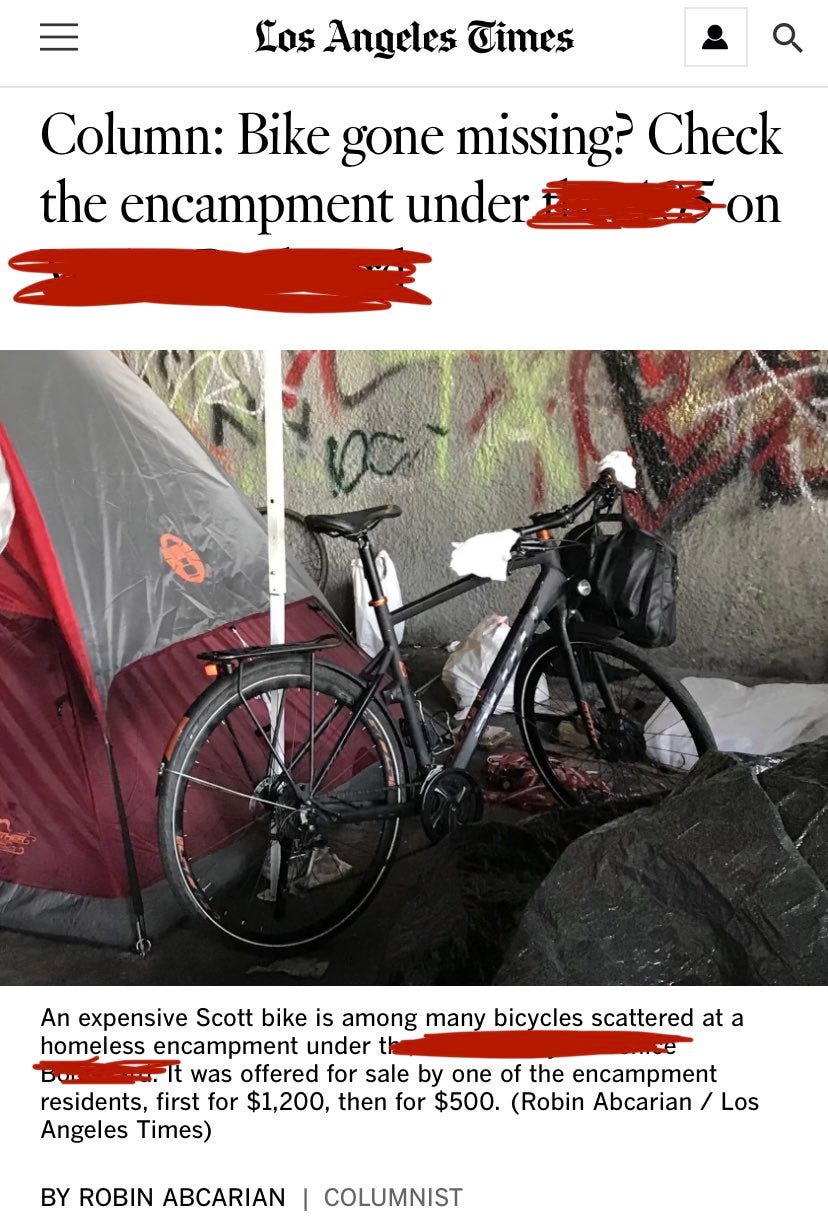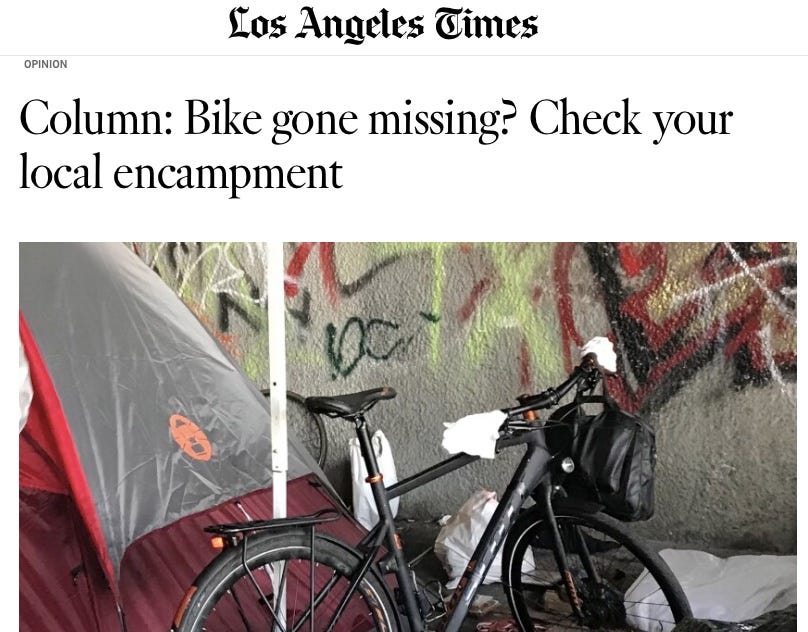LA Times Columnist Incites Violence Against Homeless Encampment in Cruel Display of Narc Journalism
When calls for incarceration are our only vehicle for empathy, mass incarceration is inevitable.
One of the most grating modes of journalism is the Faux Investigative, Faux Advocacy mode of journalism. This typically involves the reporter or writer in question engaging in all the aesthetics of gumshoe truth-telling reporter uncovering misdeeds—sometimes complete with loudly pronounced information requests from officials, parking lot ambush interviews, b-roll of our hero hovering over documents—But, when one examines the political content of the story, one realizes that it’s really just a press release for capital interests and cops. The targets are typically low-hanging fruit and fairly powerless: immigrant-owned restaurants, low-level “criminals,” “welfare fraud,” and the most popular sub-genre of this mode: criticizing police for not adequately clamping down on whatever minor crime their middle-class consumers are outraged by that week.
Reporters, namely local TV News reporters, love this mode because they get to view themselves as Woodward and Bernstein doing vaguely Reporterly things, but they also get to carry out their primary function of making advertisers and real estate interests happy. Finley Peter Dunne’s well-worn adage that journalism should be about “comforting the afflicted and afflicting the comfortable” is turned completely on its head, reduced to pure aesthetic: They appear as if they’re afflicting the comfortable, but really they’re modestly annoying the comfortable by insisting they are not adequately, themselves, afflicting the afflicted.
This mode was on full display Wednesday afternoon when Los Angeles Times columnist Robin Abcarian decided to venture outside of her usual role of opinion-haver into intrepid journalist investigating alleged bicycle thefts by Los Angeles’s homeless population. The column’s initial headline and picture caption gave the exact location these allegedly stolen bikes were being stored, inviting hundreds of thousands of Los Angeles Times readers to go to this precise location and retrieve, presumably by either state-sanctioned or non-state-sanctioned force, their stolen bikes.
As journalist Mariah Castañeda first noted, this headline was dangerous:
The location, in case it isn’t clear, was redacted by Castañeda, but one gets the general idea: a cross street and an invitation to the reader to go scour a specific homeless camp to find their lost belongings. After justified outrage from local homeless activists, including KTown for All, which said it was “encouraging vigilantism,” the Los Angeles Times changed the headline from an invitation for vigilantes to visit a specific homeless encampment, to inviting vigilantes to visit all encampments, which is actually worse:
Eventually the incitement to violence against LA’s homeless population was dropped altogether from the article, without any notation of the changes. The headline now reads:
In the column, Abcarian tags along with James Weitz, our heroic yuppie vigilante tracking down his stolen $4,000 bicycle. Along the way we get the typical tropes of the genre: bumbling cops, faceless bureaucrats indifferent to the “organized theft ring,” and a corrupt political establishment not doing enough to arrest, jail, and prosecute L.A.’s homeless bike thieves, complete with cross streets of where the alleged misdeeds were being plotted and carried out.
In case it’s not clear this is effectively doxing. Doxing is the practice of publishing personal details and private addresses of persons in order to harass and target them, or expose them to potential third party violence. By any objective definition of this term, what Abcarian did in the initial article was dox those who lived in that particular homeless camp, accusing some unspecified number of its residents of running an organized crime ring and inviting readers to come visit their home and sus out criminality for themselves.
Several Los Angeles Times reporters, apparently joining in the outrage, breathlessly shared the column—physical address in the headline and all—displaying anger at the LAPD’s supposed unwillingness to further criminalize a population of people who are, by definition, poor and indigent.
LA Times reporter David Zahniser:
LA Times California Enterprise Editor:
LA Times reporter Benjamin Oreskes:
A couple things are going on here. Obviously, having one’s bike stolen is a pain in the ass: It’s a major inconvenience and costs the bike owner hundreds or even thousands of dollars. But certainly, one would hope that none of these reporters entered the field of journalism so they could narc to police about crimes committed by the most vulnerable population in the city and demand they arrest and cage them for creating this inconvenience. Doubly so when this demand is accompanied by a fairly clear call for incitement complete with a physical address of where the criminal element is supposedly lurking without accountability.
But this is our only reference point for “doing something” in the United States. Carceralism isn’t the most popular tool, it’s the only tool. Thus, when faced with a story of stolen property, the only response is targeting anger at the forces of incarceration for not being aggressive enough in their incarceration. In our society, the most potent and popular mode of empathy is carcerlism. It’s how you show you care—the more severe the demands for arrests and “justice,” the more one peacocks how much they dislike “crime” and how much their heart bleeds for its victims. Anyone not doing so, anyone not calling for swift and harsh incarceration of the alleged perpetrator, is seen as suspect, weak-kneed, a far left ideologue, untethered to reality, or perhaps even a criminal themselves.
This moral hazard is one of the driving forces behind our media habit of narc journalism, which itself drives our unprecedented and unparalleled rate of incarceration. Abcarian isn’t alone. The average nightly news cast includes a nonstop torrent of stories involving reporters outraged police are not sufficiently arresting and caging people the outlet has deemed criminals. This is how one stands up for the little man. This is how one displays empathy. The more calls for incarceration, the more a journalist shows they care. The more years slapped on to a sentence, the more a prosecutor shows they care. The more new laws on the books to criminalize the public, the more a legislator shows they care.
There is, of course, a whole body of work showing that another isn’t just possible, but far more rational. It’s a basic fact of sociology that unequal societies tend to have higher crime, as well as lower social trust. California has the fourth highest rate of income inequality in the country and, by far, the highest home prices in the continental U.S. (the average home is $683,996), second only to Hawaii. Of the 10 most expensive cities in the U.S., four are in California. The state, not unrelatedly, has the second largest homeless population in the country, growing 16.2% from 2007 to 2020. But connecting these two forces—runaway inequity and a lack of affordable housing with upticks in property crime—is relegated to a handful of think pieces and academic conferences. This basic fact that inequality results in an increase in property crimes is seen as a side issue, not a proper response to a story of unhoused people stealing bikes. Because our society has no grammar for this as a response, no cultural point of reference, lobbying for social solutions to social problems—rather than the pat moralism of calling for more police crackdowns—is not seen as a way of publicly displaying one’s empathy. Despite the fact that several studies show no relation between increased incarceration and decrease in crime, such a correlation is simply assumed to be true because it feels true.
We therefore do not see outraged Los Angeles Times reporters responding to reports of bike thefts by calling for more social services, higher wages or housing as a human right. Abcarian didn’t reach out to local lawmakers angered they aren’t providing a basic living income; Abcarian didn’t demand Biden get behind a universal housing guarantee; Abcarian wasn’t performatively demanding answers from state leaders for not controlling skyrocketing home prices. She instead does what everyone does: run to the cops. Because, in our culture, it’s the only way we know how to show we care.









As someone who shared this article on Twitter mentioned, it’s very telling how so many people automatically assume a poor person, specifically in this case one who is also unhoused, having something nice automatically means they stole it.
Do we really believe that the homeless are buying and selling all of those bikes in some sort of legitimate operation? A guy’s stolen bike turned up in that cache. Do the story on how that marketplace works. Try and prove the supply isn’t coming from stolen bikes.